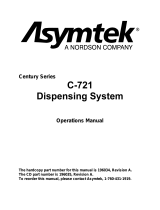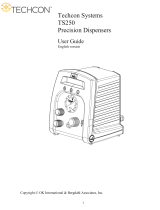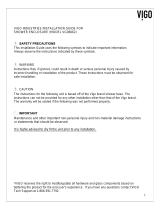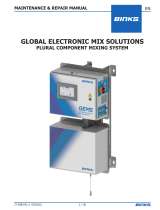
Operating Manual
Bedienungsanleitung
2 l Semi-Automatic Dispense System
2 l-Halbautomatisches Dosiersystem
97007/97008/97009/97010

2

3
English......................................................................................................................6-28
Deutsch...................................................................................................................29-53

4
Contents
1 Please observe the following......................................................................................6
1.1 Emphasized Sections.....................................................................................................6
1.2 Items Supplied................................................................................................................6
1.3 For Your Safety ..............................................................................................................7
1.4 Field of Application (Intended Usage) ............................................................................8
2 Description....................................................................................................................9
2.1 Theory of Operation........................................................................................................9
2.2 Operating Elements and Connections..........................................................................10
3 Technical Data............................................................................................................13
3.1 Energy Requirements...................................................................................................13
3.1.1 Electric’s.......................................................................................................................13
3.1.2 Pneumatics...................................................................................................................13
3.2 Connections and Dimensions.......................................................................................13
3.3 Other Data....................................................................................................................14
3.4 Safety Device ...............................................................................................................14
4 Installation ..................................................................................................................14
4.1 Environmental and Operating Conditions.....................................................................14
4.2 Space Requirements....................................................................................................15
4.3 Connecting the Unit......................................................................................................15
5 Dispensing..................................................................................................................15
5.1 First Operation..............................................................................................................15
5.2 Filling and Refilling the Product Reservoir....................................................................16
5.3 Adjusting the Dispensed Quantity ................................................................................17
5.3.1 Time Controlled Mode..................................................................................................17
5.3.2 Continuous Mode.........................................................................................................18
5.4 Shutdown for Longer Periods of Non-use ....................................................................19
5.5 Returning to Operation after Longer Periods of Non-use.............................................19

5
Contents
6 Care and Maintenance............................................................................................... 19
7 Troubleshooting ........................................................................................................20
7.1 Troubleshooting...........................................................................................................20
7.2 Replacing the Rupture Disk......................................................................................... 22
8 Special Adjustments (for Service Personal only)...................................................23
8.1 Adjusting the Level Sensor (only 97009).................................................................... 23
8.2 External Connection Empty Signal (only 97009) ........................................................24
9 Annex..........................................................................................................................25
9.1 Spare Parts..................................................................................................................25
9.2 Pin assignment............................................................................................................26
9.3 Declaration of EC Conformity......................................................................................28

6
1 Please observe the following
1.1 Emphasized Sections
Warning!
Refers to safety regulations and requires safety measures that protect the operator or other
persons from injury or danger to life.
Caution!
Emphasizes what must be done or avoided so that the unit or other property
is not damaged.
Notice
Gives recommendations for better handling or adjustment of the unit during operation as well as
for service activities.
The numbers printed in bold in the text refer to the corresponding position numbers in the
illustration on page 10-12.
• The point emphasizes an instruction step.
Instruction steps in the illustrations are
indicated with arrows.
When several instruction steps are indicated in
an illustration, the shading of the arrow has the
following meaning:
Black arrow = 1st step
Grey arrow = 2nd step
White arrow = 3rd step
1.2 Items Supplied
– Semi-automatic Dispense System
– Foot switch (97007 and 97010 only)
– Tube “Silicone Grease”
– Bottle nesting basket (97009 only)
– Drip cup (3)
– Power cord
– Operating manual
As a result of technical development, the illustrations and descriptions in this instruction manual
can deviate in detail from the actual unit delivered.

7
1 Please observe the following
1.3 For Your Safety
For safe and successful operation of the unit, read these instructions completely. The
manufacturer cannot be held responsible for damage or injury of any kind because of misuse or
improper application or because of failure to observe safety instructions or warnings.
Be sure to retain this manual for future reference.
Request the technical data sheet and the safety data sheet (acc. to the EC Directive 91/155/EC)
for the LOCTITE
®
-product used at
Henkel Loctite Deutschland GmbH
www.loctite.com for US and Canada version of data sheets
+49 89 92 68 11 67 for English version of data sheets;
089-92 68 11 22 for German version of data sheets.
FOLLOW UNCONDITIONALLY THE INSTRUCTIONS OF THESE DATA SHEETS!
If chemical products are not properly handled, damage to health can result!
Observe general safety regulations for the handling of chemicals!
Observe manufacturer’s instructions!
Request a safety data sheet for the LOCTITE-product used!
When working with pressurized air, wear protective glasses!
Damage to the power cord or the housing can result in contact with live electrical parts.
Check the power cord and the unit before each use.
If the power cord or the unit is damaged, do not operate!
Replace a damaged power cord with a new one.
The unit may be opened and repaired only by an authorized service personal.
Never fill the product directly into the
Product Reservoir!
The pneumatic safety devices would
become clogged and therefore
ineffective!
Insert only products packaged in
original LOCTITE containers!

8
1 Please observe the following
1.4 Field of Application (Intended Usage)
The Semi-automatic Dispense System is suitable for the exact application of LOCTITE products
at manual workstations such as in workshops, laboratories and industrial installations.
It is designed for a product application position.
– The Semi-automatic Dispense System 97010 is equipped with precision pressure regulator
0-1 bar (0-15 PSI).
– The Controller 97007 is equipped with a pressure regulator 0-8 bar (0-115 PSI).
– Both, 97008 and 97009 are equipped with a precision pressure regulator
0-4 bar (0-60 PSI).
– The Controller 97009 additionally has a low level sensor.
With the Semi-automatic Dispense System, anaerobic, UV curing and cyanoacrylate adhesives
can be dispensed.
The capacity of the integrated reservoir is:
– 500 gr. bottle for CA Products – 1 lb. bottle
– 250 ml bottle for Anaerobics – 1 Liter bottle
– Bottle with a ø 124 mm and – 2 kg bottle
a height of 250 mm

9
2 Description
2.1 Theory of Operation
The Semi-automatic Dispense System is connected to an external pneumatic supply. It regulates
the adjusted dispensing pressure and controls the dispensing during the selected dispensing
time.
An uncovered bottle of LOCTITE product is placed directly into the integrated reservoir, and the
reservoir lid is clamped in place.
It is then pressurized using clean, filtered dry air. Air within the reservoir will push down on the
liquid in the bottle and force it through the product feedline to the dispensing valve.
The amount of product dispensed is controlled by three main factors:
– Amount of pressure in the reservoir
– Length of time the dispensing valve remains open
– Dispensing needle size
Additional Features (97009 only)
Two additionally features are available from batch no. 2FFE0001.
EMPTY:
If the reservoir is empty the contact of the level sensor opens. A beeping tone indicates the
message and the sign “U” is displayed.
READY:
If the dispensing cycle is finished and the reservoir is not empty closes a contact.
Both signals are available as dry contacts at the XS 1 start interface for optional connection to a
higher-ranking controller or a warning light.
The start of a dispensing cycle is not locked when EMPTY is indicated.
Pay attention if cyanoacrylate is dispensed – Air in the feedline results in curing of the product!
When the user quits the EMPTY message and the beeping tone with the button ENTER the
signal at the interface XS 1 is quit, too.
The READY signal will only be indicated, when the reservoir is refilled and the sensor is
activated.

10
2 Description
2.2 Operating Elements and Connections
1
Reservoir Tank Fitting ¼” NPT
2
Reservoir Knob
3
Reservoir Lid
4
Drip Funnel
While changing the product bottle, the reservoir lid
can be placed here.
5
Power Switch I/O (ON/OFF)
6
Power Supply Socket
7
Power Fuse, 2 A semi time-lag, glass type
Removing, jumpering or over riding of the
safety devices can result in damage to the unit
and is therefore prohibited!
8
Pneumatic Supply
9
Socket XS 1: Start
The footswitch is connected here. It is also the
output for the READY and EMPTY signals.
12
3
4
5
67
8
9

11
2 Description
10
Depressurizing Valve
Valve position : The reservoir is depressurized.
Valve position : The reservoir can be
pressurized.
11
Control Air Connection: Dispensing Valve A
Dispensing valve open I.
Dispensing valve closed O.
Close port O for single actuated valve.
12
Pressure Regulator
Regulator for setting the dispensing pressure.
Pulling and then turning the regulator knob can
adjust the dispensing pressure. After releasing, the
regulator knob re-engages a lock that prevents the
setting from being unintentionally changed.
97007 only:
Always adjust the desired pressure from lower to
higher in the clockwise direction. For example, if the
pressure should be reduced from 3 bar to 2 bar,
first reduce the pressure by turning in the counter
clockwise direction from 3 bar to 1 bar and then
increase to 2 bar by turning in the clockwise
direction. With this method, a stable setting of the
pressure is ensured.
13
Pressure Gauge
Indication of the reservoir pressure.
14
Bottle Nesting Block (97009 only)
For fixing 250 ml and 500 g bottles aligned correctly
to the level sensor.
10
11
12
13
14

12
2 Description
15
Button
Button for the storage of the new values set for the
dispensing time [s].
When the indication of the dispensing time [s] in the
digital display blinks, the indicated dispensing time
is stored by pressing button and the display stops
blinking.
16
Button
Button for filling the product feedline. In both modes
the product is dispensed as long as button is
pressed.
– In time-controlled mode, the dispensing time is
not changed.
17
Buttons
Buttons for changing the dispensing time for a
dispensing sequence.
When button or is pressed, the display
of the dispensing time [s] in the digital display begins to blink. The dispensing time is adjustable
from 0.01 to 99.9 s.
Buttons for switching from time controlled mode to continuous mode.
With the simultaneous pressing of the buttons for more than 0.5 seconds, an operating mode
change takes place to the Continuous mode. In the display, “con” appears. The lighting of the
LED “CONT.“ indicates Continuous mode.
During dispensing, the elapsed dispensing time is indicated in the digital display beginning each
time with 0.00 s. The last dispensing time remains displayed until the next start.
– Switching back to time controlled mode without storage of the dispensing time by renewed
pressing of button or . The LED extinguishes. In the digital display, the dispensing time
is blinking.
– Switching back to time controlled mode with storage of the dispensing time by pressing
button . The LED extinguishes. The indicated dispensing time is stored.
18
Digital Display
Three-figure Display of the dispense time [s].
19
LED “CONT“
The lighting of the red LED “CONT“ indicates Continuous mode.
CO
N
T
CO
NT
15
16
171819

13
3 Technical Data
3.1 Energy Requirements
3.1.1 Electric’s
Power supply Power supply 90 – 260 V AC; 47 – 63 Hz
Power consumption Approx. 25 W
Power protection Glass tube, fine wire fuse, 2 A semi time-lag
Internal control voltage 24 V DC
3.1.2 Pneumatics
Pneumatic supply Min. 5 bar (70 PSI), max. 10 bar (145 PSI)
Quality
If the required quality is not
achieved, install a LOCTITE
filter regulator.
Filtered 10 µm, oil-free, non-condensing
Accessory Order No. 97120
Regulation range of the
pressure regulator
97007
0-8 bar
(0-115 PSI)
97008
0-4 bar
(0-60 PSI)
97009
0-4 bar
(0-60 PSI)
97010
0-1 bar
(0-15 PSI)
Pressure indication 0-10 bar
(0-145 PSI)
0-4 bar
(0-60 PSI)
0-4 bar
(0-60 PSI)
0-1 bar
(0-15 PSI)
3.2 Connections and Dimensions
Power connection Cold appliance coupling IEC 320 acc. to VDE 0625
Dimensions W x H x D: 350 x 335 x 230 mm (13.8 x 13.2 x 9.1 inch)
Pneumatic supply 97008 and 97009:
Internal Dia. 4 mm; external Dia. 6 mm +0.05, -0.10
External Dia. ¼ in. is not suitable!
97007 and 97010:
1/4” NPT fitting

14
3 Technical Data
3.3 Other Data
Weight 7.5 kg
Operation Temperature: +10 °C to +40 °C (+50 °F to +104 °F)
Storage Temperature -10 °C to +60 °C (+14 °F to +140 °F)
Continuous noise level < 65 dB(A)
3.4 Safety Device
Over-pressure safety
(rupture disc)
min. 9 bar (130 PSI); max. 12.5 bar (174 PSI)
Tightening torque of the rupture disc max. 20 Nm
4 Installation
4.1 Environmental and Operating Conditions
– Keep the pressure hose as short as possible. Short switch-on and switch-off times for the
dispensing valve are within reach.
– Keep product feed lines as short as possible. The shorter the feedline the smaller the specific
resistance and the lower the dispensing pressure can be. Avoid kinking.
– In any cases, the pressure hose and product feedline should not be longer than 2 m.
– Do not use inflexible hoses and feed lines, so that unnecessary loads on the fittings will be
avoided.
– Keep all fittings tight.
– No direct sunlight; no UV light.
– No condensing humidity.
– No splash water.

15
4 Installation
4.2 Space Requirements
4.3 Connecting the Unit
• Use only the cable and hose sets supplied.
• Connect power cord to power supply socket 6.
• Connect air pressure supply to pneumatic connection 8.
5 Dispensing
5.1 First Operation
• Check that the dispensing valve is connected correctly according to the operating manual.
• Switch the power switch 5 to position I (ON).
When you switch on the controller 97009 an empty signal with a peeping tone is indicated.
This will happen because there is no product bottle in the reservoir.
~230 mm
~9.1"
~335 mm
~13.2"
~350 mm
~13.8"

16
5 Dispensing
5.2 Filling and Refilling the Product Reservoir
Never fill the product directly into the reservoir!
The pneumatic and safety devices would become clogged and therefore ineffective!
Never completely empty the bottle in the reservoir! The entry of air into the product line
causes problems with dispensing.
When dispensing cyanoacrylate and an empty signal is shown (only 97009), refill the
product reservoir immediately, since air in the product line results in curing of the
product! The dispensing can be further started.
Before loosening the reservoir knobs 2, the reservoir must be depressurized (pressure-
free)!
The reservoir is depressurized when the depressurizing valve 10 is in position and pressure
gauge 13 indicates no pressure.
• Loosen the reservoir knobs 2 and
remove the lid 1.
Product residue on the product
feedline!
Do not contaminate the product
feedline with dust or moisture!
• Place the lid 1 on the drip funnel.
• Check that there is no condensed
moisture at the bottle or the sensor
surface.
97009 only:
• Place the bottle in the bottle-nesting
block 14.
• Check that the product bottle inserted in
the bottle-nesting block 14 is pressed
again the level sensor.
• Insert a full product bottle in the reservoir.
• Check that the product bottle inserted is pressed against the level sensor.
If there is a gap between the bottle and the sensor, the sensor has to be adjusted.
The adjustment should be done by authorized service personal only, see section 8.
• Insert the product feedline into the bottle and put on the lid 1.
• Uniformly tighten the reservoir knobs 2 by hand.
• Set the depressurizing valve 10 to position (pressurize).

17
5 Dispensing
5.3 Adjusting the Dispensed Quantity
5.3.1 Time Controlled Mode
This mode of operation is used for spot shaped wetting or drop dispensing.
• With buttons or set the dispensing
time to 0.50 s. The indication of the dispensing
time in the digital display begins blinking.
• With the pressure regulator set the
dispensing pressure to 0.5 bar
(approx. 7 PSI).
If the dispensed quantity is too small:
• Increase the dispensing pressure. After this
check the dispensed quantity.
Repeat this sequence until the desired
dispensed quantity is roughly achieved.
When the desired dispensed quantity is roughly achieved:
• Set the exact dispensed quantity by changing the dispensing time with button or .
• Press the footswitch to check the dispensed quantity.
Storing of the dispensed quantity setting for subsequent dispensing:
• Press button . The indication of the dispensing time in the digital display stops blinking.
If the desired dispensed quantity is not achieved:
• With a larger (or smaller) dispensing needle, repeat the steps of this section.
CONT
CONT

18
5 Dispensing
5.3.2 Continuous Mode
This mode of operation is used for the application of beads.
• With the pressure regulator 12 set the dispensing pressure to 0.5 bar (approx. 7 PSI).
• Press the buttons and simultaneously.
The lighting of the LED “CONT.“ indicates
Continuous mode. The display of the
dispensing time in the digital display is set
to con.
• Press the button (or the foot switch) to
check if the product is ejected quickly enough
from the dispensing needle.
When the dispensed quantity is achieved too slowly:
• Increase the dispensing pressure or repeat this sequence with a larger dispensing needle.
– Switching back to time controlled mode without storage of the dispensing time by renewed
pressing of button or . The LED extinguishes. In the digital display, the dispensing time
is blinking.
– Switching back to time controlled mode with storage of the dispensing time by
pressing button . The LED extinguishes. The indicated dispensing time is stored.
CONT
CONTCONT

19
5 Dispensing
5.4 Shutdown for Longer Periods of Non-use
• Disconnect the pneumatic supply from the controller.
5.5 Returning to Operation after Longer Periods of Non-use
• Reconnect the pneumatic supply to the controller.
• Check the installation according to Chapter 4.
• Return to operation according to Section 5.1.
6 Care and Maintenance
• Occasionally the o-ring at the reservoir lid 3 should be lubricated with the enclosed silicone
grease. This will prolong the life of the o-ring.
Clean hands after application of grease to assure surfaces to be bonded are clean. Otherwise
bonding might fail.
• Clean the sensor surface, the drip funnel and drip cup as required.
Both the bottle surface and the sensor surface must be free of condensed moisture!
• Check both the reservoir knobs 2 and the product feedline on a regular basis. If there is any
sign of cracks, replace them!

20
7 Troubleshooting
7.1 Troubleshooting
Type of Malfunction Possible Causes Corrections
The digital display does not
light.
– No power voltage present.
– Powers switch 5 in position O (OFF).
– Power fuse 7 is defective.
– Power cord is defective.
– Control unit is defective.
• Check the power voltage.
• Switch power switch to position I (ON).
• Check/replace fuse.
• Replace power cord.
• Loctite Service.
No needle movement on the
pressure gauge.
– No air pressure present.
– Pressure gauge defective.
– Pressure regulator defective.
• Check depressurizing valve 10 and
pneumatic supply.
• Replace gauge.
• Replace regulator.
The desired pressure is not
achieved.
– Supply pressure inadequate.
• Increase the supply pressure (min
0.5 bar above reservoir pressure).
LED does not light. – LED defect.
• When the controller is operational, the
unit can be used until repaired by
Loctite Service
No start signal.
– Plug on the socket XS 1: Start 9 is
loose.
– Footswitch defective.
• Switch the power switch to the
position O (OFF). Tighten the screws
of the plug. Switch the power switch to
the position I (ON).
• Replace the Footswitch.
No product, too little or too
much product.
– Dispensing pressure not set correctly.
– Pressure hose not properly
connected.
– Luer-Lock tip cap not removed.
– Dispensing needle clogged, too
small or too large.
– Dispensing valve not correctly
connected or defective.
– Product reservoir not switched on.
– Product reservoir is empty.
• Adjust dispensing pressure setting.
• Connect air pressure hose correctly.
• Replace Luer-Lock tip cap with a
dispensing needle.
• Replace dispensing needle.
• Check the dispensing valve (see
instruction manual for dispensing
valve).
• Check product reservoir.
• Refill product reservoir (see
Section 5.2).
Page is loading ...
Page is loading ...
Page is loading ...
Page is loading ...
Page is loading ...
Page is loading ...
Page is loading ...
Page is loading ...
-
 1
1
-
 2
2
-
 3
3
-
 4
4
-
 5
5
-
 6
6
-
 7
7
-
 8
8
-
 9
9
-
 10
10
-
 11
11
-
 12
12
-
 13
13
-
 14
14
-
 15
15
-
 16
16
-
 17
17
-
 18
18
-
 19
19
-
 20
20
-
 21
21
-
 22
22
-
 23
23
-
 24
24
-
 25
25
-
 26
26
-
 27
27
-
 28
28
Loctite 97009 Operating instructions
- Type
- Operating instructions
Ask a question and I''ll find the answer in the document
Finding information in a document is now easier with AI
Related papers
-
Loctite 97108 User manual
-
Loctite VoluDrop UV 97650 Operating instructions
-
Loctite 97102 Operating instructions
-
Loctite 98084 Operating instructions
-
Loctite 050A Operating instructions
-
Loctite 1390322 Operating instructions
-
Loctite 97112 Operating instructions
-
Loctite 97136 Operating instructions
-
Loctite SD10 Operating instructions
-
Loctite 1167582 Operating instructions
Other documents
-
 Asymtek C-721 Specification
Asymtek C-721 Specification
-
 TECHCON SYSTEMS TS250 User manual
TECHCON SYSTEMS TS250 User manual
-
Matco Tools MVP6000 User manual
-
Graco 1206 User manual
-
Bull LP 97008 Owner's manual
-
Graco 332095A User manual
-
Graco 332093A Dispensit 702-20, Dispense Valve User manual
-
 Vigo VG6062CHCL38WS User manual
Vigo VG6062CHCL38WS User manual
-
 Binks GEMS 2K Electronic Mixing Solution User manual
Binks GEMS 2K Electronic Mixing Solution User manual
-
Graco 332094A User manual































